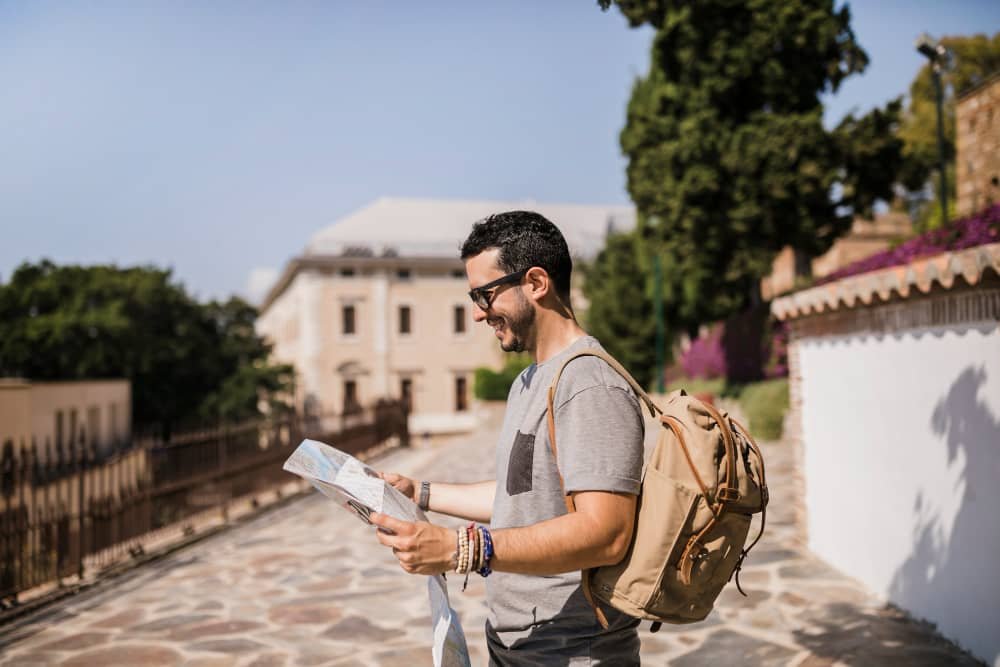Greece Travel Tips: 10 Things To Know Before You Go
Planning a trip to Greece? This article will provide 10 Greece travel tips before booking your ticket. Get ready to undertake an unforgettable adventure as you surrender yourself to the captivating charm of this stunning destination. Greece is a mandatory destination for avid adventurers with its rich history, awe-inspiring landscapes, and vibrant atmosphere. To guarantee a truly remarkable experience, we have compiled some critical travel advice specifically tailored for your Greek adventure.
Greece Travel Tips to Know Before You Go
A scarf can primarily be a blanket or pillow during your long-haul flight. Nowadays, having a blanket included on your flight is becoming less common, and sometimes, the cabin doesn’t even have enough for everyone. The best advice is to bring something functional because flights can get chilly. A relatively thick, large scarf will almost always do the job.

Why Greece is a must-visit destination
Greece is a must-visit destination because of its rich history and archaeological treasures. From the ancient ruins of Athens, including the iconic Acropolis and Parthenon, to the archaeological site of Delphi and the Palace of Knossos in Crete, Greece offers a unique opportunity to step back in time and explore some of the most important historical sites in the world.
Another reason why Greece should be on your travel bucket list is its stunning natural beauty. With over 6,000 islands scattered across the Aegean and Ionian Seas, Greece boasts some of Europe’s most picturesque beaches and crystal-clear waters. From popular tourist destinations like Santorini and Mykonos to lesser-known gems like Milos or Zakynthos, there is an island for every taste – whether you seek vibrant nightlife or peaceful solitude.
Additionally, Greek cuisine is renowned worldwide for its delicious flavors and fresh ingredients. Indulge in traditional dishes such as moussaka, souvlaki, or spanakopita while sipping local wines or ouzo. The warmth of Greek hospitality will make your culinary experience even more memorable.
Greece’s blend of history, natural beauty, and gastronomy make it a must-visit destination that promises unforgettable experiences for any traveler seeking adventure or relaxation amidst stunning landscapes steeped in centuries-old stories.
Planning Ahead: Get to Know the Basics of Greek Culture
To properly plan a trip to Greece, one must first familiarize oneself with the essence of Greek culture. Above all else, it is essential to recognize that Greeks are celebrated for their unparalleled warmth and hospitality. Their unwavering dedication to welcoming guests and creating an environment reminiscent of home is remarkable. The family is undeniably significant in Greek culture, as solid connections and close relationships are cherished dearly.
Another important aspect of Greek culture to be aware of is their love for food. Greeks are passionate about their cuisine, and known for its freshness and simplicity. Traditional dishes such as moussaka, souvlaki, and baklava are not missed when visiting Greece. Furthermore, enjoying meals slowly and linking over conversations at the table is customary.
Lastly, understanding essential Greek customs can go a long way in ensuring a respectful experience while traveling in Greece. For example, greeting locals with warm yassas (hello) or efharisto (thank you) will be greatly appreciated. It is also common practice to dress modestly when visiting churches or religious sites out of respect for the local customs and traditions.

Currency and Exchange Rates: Tips for handling money
Currency and exchange rates can significantly impact your travel experience when visiting a foreign country like Greece. Familiarizing yourself with the local currency, the Euro (€) in Greece is essential. Before you go, make sure to check the current exchange rate so you have an idea of how much your money will be worth once you arrive. This will help you create a budget and avoid any surprises.
When handling money in Greece, it is wise to carry cash with you for small purchases or places that may not accept credit cards. However, be cautious about carrying too much cash, as it can be risky. Consider using a money belt or hidden pouch to keep your cash safe while exploring crowded areas or tourist sites.
Another tip for handling money in Greece is to use debit or credit cards whenever possible. Most businesses accept cards, especially in popular tourist areas like Athens and Santorini. However, it’s always good to have some backup cash in case of any issues with card machines or if you find yourself in more remote locations where card payment options might be limited.
Being prepared and informed about currency and exchange rates is vital when traveling to Greece. These tips and planning can ensure a smooth financial experience during your trip.

Weather and Best Time to Visit: Ideal seasons to plan your trip. Greece is known for its Mediterranean climate, with hot summers and mild winters. The best time to visit Greece depends on the type of experience you are looking for.
If you prefer warm weather and want to enjoy the beautiful beaches, then the summer months of June, July, and August are perfect for you. During this time, temperatures can reach up to 35°C (95°F), making it ideal for swimming in the crystal-clear waters of the Aegean Sea or exploring the ancient ruins under sunny skies.
On the other hand, if you prefer slightly cooler temperatures and want to avoid crowds, spring (April – May) and autumn (September – October) would be a better choice. During these seasons, temperatures range from 15°C to 25°C (59°F – 77°F), providing comfortable weather for sightseeing in Athens or exploring the stunning landscapes of Santorini without having to compete with hordes of tourists.
In conclusion, Greece offers something for every season depending on your preferences. Whether you desire hot summer days spent lounging on picturesque beaches or cooler temperatures with fewer crowds while exploring historical sites, choosing an ideal season can significantly enhance your travel experience in Greece.

Transportation: Getting around the country efficiently
Greece offers various modes of transportation that allow visitors to explore the country efficiently. One of the most popular options is renting a car, which provides flexibility and freedom to travel at your own pace. With a well-developed road network, driving in Greece allows you to easily reach remote locations and discover hidden gems off the beaten path. However, it’s important to note that Greek drivers can be unpredictable, so exercise caution and familiarize yourself with local traffic rules.
Another efficient way to get around Greece is by public transportation, such as buses or trains. The bus system in Greece is extensive, connecting major cities and towns across the country. It’s a reliable and cost-effective option for traveling between destinations without worrying about parking or navigating unfamiliar roads. Additionally, several train routes in Greece offer scenic journeys through picturesque landscapes.
For island-hopping adventures, ferries are an essential part of transportation in Greece. With thousands of islands spread throughout the Aegean and Ionian Seas, ferries provide a convenient means of getting from one island to another or reaching mainland ports from popular tourist destinations like Santorini or Mykonos. Ferries come in different categories ranging from slow traditional boats to high-speed catamarans, allowing travelers to choose between budget-friendly options or faster connections depending on their preferences.

Cultural Etiquette: Dos and don’ts in Greek culture
When visiting Greece, you must familiarize yourself with the cultural etiquette to ensure a meaningful and respectful experience. One crucial aspect of Greek culture is personal relationships and hospitality. Greeks are known for their warm and welcoming nature, so it is important to reciprocate this kindness by greeting others with a smile and a friendly Yasou (hello). Additionally, showing respect towards elders is highly valued in Greek society, so be sure to address them using the formal Kyria or Kyrie followed by their last name.
Furthermore, dining in Greece has several dos and don’ts to remember. It is customary to wait until everyone at the table has been served before starting your meal. Also, remember that Greeks often enjoy long meals with lively conversations, so take your time eating and engaging in discussions. However, be cautious not to rest your elbows on the table as it may be seen as impolite. Lastly, when paying for a meal or any service in Greece, it is common practice to leave a small tip of about 5-10% of the total bill as a sign of appreciation.
Overall, respecting cultural etiquette while immersing yourself in Greek culture will enhance your travel experience by fostering positive interactions with locals and deepening your understanding of this vibrant country.

Must-Try Greek Cuisine: Delicious dishes to savor
Greek cuisine is renowned for its rich and flavorful dishes that satisfy any food lover’s palate. One must-try dish is moussaka, a hearty casserole made with layers of eggplant, ground meat (usually beef or lamb), and a creamy bechamel sauce. The combination of flavors and textures in this dish is simply divine.
Another delicious Greek dish is souvlaki, which consists of skewered and grilled pieces of tender meat, typically pork or chicken. This mouthwatering street food is often served with pita bread, tzatziki sauce, and crispy french fries. The simplicity of the ingredients allows the authentic flavors to shine through, making it an absolute must-try when visiting Greece.
In addition to these classic dishes, there are countless other Greek delicacies worth exploring, such as spanakopita (a savory spinach pie), dolmades (stuffed grape leaves), and baklava (a sweet pastry made with layers of filo dough, nuts, and honey syrup). Exploring the diverse flavors of Greek cuisine will undoubtedly leave you wanting more.

Safety: How to Stay Alert and Avoid Scams
Scams can happen anywhere, including popular tourist destinations like Greece. To ensure your safety and avoid falling victim to scams, it is crucial to stay alert and aware of common tactics scammers use. Firstly, always watch your belongings and never leave them unattended. Pickpocketing is prevalent in crowded markets, public transportation, or popular tourist spots. Secondly, be cautious when dealing with strangers offering unsolicited help or services. While there are genuinely helpful locals, some individuals may have ulterior motives and try to take advantage of tourists’ unfamiliarity with the area.
Moreover, it is essential to familiarize yourself with common scams that occur in Greece. One notable scam involves fake police officers who approach tourists asking for identification or inspecting their belongings under the pretense of searching for counterfeit money or drugs. Genuine police officers will always identify themselves correctly and display credentials before requesting any action from you. Additionally, beware of friendly locals inviting you for a drink at a particular bar or club where inflated prices may surprise you when it’s time to pay the bill.
By staying vigilant and being aware of potential scams while traveling in Greece, you can protect yourself from becoming a victim and fully enjoy your trip without any unwanted incidents dampening your experience.
Tips for Exploring Ancient Sites and Monuments
Research and plan ahead: Before visiting an ancient site or monument, it’s crucial to research and plan your visit. Familiarize yourself with the history, significance, and cultural context of the site you’re exploring. This will enhance your understanding and appreciation of what you see during your visit.
Please dress comfortably and appropriately: Ancient sites can be vast and require a lot of walking, so it’s important to wear comfortable shoes and clothing suitable for the weather conditions. Additionally, specific religious or cultural sites may have dress codes to which visitors are expected to adhere out of respect. Being dressed appropriately will ensure your comfort and allow you to fully immerse yourself in the experience without any restrictions or discomfort.
Hire a knowledgeable guide: To truly make the most out of exploring ancient sites, consider hiring a qualified guide well-versed in local history and archaeology. They can provide valuable insights, answer questions, and bring the ancient ruins to life through their storytelling abilities. A guide can help you navigate through complex structures, decipher intricate carvings or inscriptions, and point out hidden details you might overlook.
Remembering these Greece travel tips will help ensure that your exploration of ancient sites and monuments is both enjoyable and educational while allowing you to delve into the rich history they hold within their walls or ruins.

Shopping Tips for Bargains in Greek Markets
Learn to Haggle: Bargaining is common in Greek markets, so don’t hesitate to negotiate the price. Start by asking for a lower price than initially quoted, and work your way up. Remember to remain polite and respectful during the bargaining process.
Explore Local Markets: While touristy areas may have their charm, local markets often offer better bargains and more authentic products. Take the time to venture off the beaten path and discover hidden gems in traditional Greek markets. These markets are also great opportunities to interact with locals and gain insight into their culture and way of life.
Timing Matters: If you’re looking for the best deals, try shopping towards the end of the day when vendors are more likely to offer discounts on perishable items or last-minute sales. Additionally, visiting markets early in the morning can give you access to fresh produce while it’s still plentiful and of the best quality.
Shopping in Greek markets can be an exciting experience filled with unique finds and great bargains if you’re willing to put in some effort!

Tips for Booking Accommodation in Greece
Look for accommodations in lesser-known areas: While popular tourist destinations like Athens and Santorini may be on your must-visit list, consider exploring lesser-known regions of Greece for a more authentic experience. Places like Nafplio, Chania, and Rhodes offer stunning landscapes, historical sites, and beautiful beaches without the crowds. Moreover, accommodations in these areas tend to be more affordable compared to the popular hotspots.
Book well in advance during peak season: Greece is a highly sought-after destination in the summer when tourists flock to enjoy its sunny shores and ancient ruins. If you plan on visiting during this busy period, booking well in advance is advisable to secure the best accommodation deals and have a more comprehensive range of options. Keep an eye out for early bird promotions or discounts offered by hotels or private rentals that can help you save money while ensuring a comfortable stay.
Consider alternative types of lodging: In addition to traditional hotels, Greece offers various types of accommodation that cater to different preferences and budgets. Opting for guesthouses or bed-and-breakfasts can provide a more personalized experience with local hosts who can offer valuable insights into Greek culture and traditions. For budget travelers or those seeking a unique adventure, camping sites are also available nationwide to pitch your tent amidst nature’s beauty at affordable rates.













